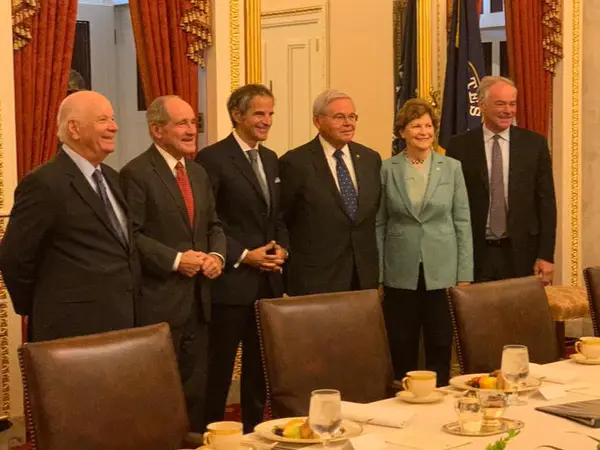A meeting on Tuesday between the head of the UN nuclear watchdog Rafael Grossi and members of the US Senate Foreign Relations Committee focused on Iran.
A day after meeting Secretary of State Antony Blinken, Grossi was invited to the Senate by Chairman of the Committee Sen. Bob Menedez, where around a dozen Senators had an opportunity to discuss Iran’s lack of full cooperation with the International Atomic Energy Agency (IAEA), with director general Grossi.
Senator Jim Risch (R-Idaho) issued a statement after the meeting saying, “Iran continues to steadily advance its nuclear program, while violating its international obligations and preventing the IAEA from fulfilling its monitoring responsibilities. Its failure to provide credible answers to the IAEA’s questions regarding its undeclared nuclear sites is unacceptable. Today, I thanked Director General Grossi for his strong leadership in pursuing the IAEA’s investigation into these sites, and urged him to continue to press Iran until it provides all required information.”
Republicans who have been sceptical of the Biden Administration’s diplomatic approach to Iran and have repeatedly urged not to make concessions to Tehran see the lack of cooperation with IAEA as proof that the Islamic Republic cannot be trusted.
In the September IAEA Board of Governors meeting, Grossi had already issued a report accusing Iran of lack of cooperation both in accounting for its past nuclear activities and also in current monitoring efforts by UN’s nuclear watchdog. However, the United States and its European allied known as E3 decided not to pursue a resolution to condemn Iran.
Senator Risch in his statement demanded a tougher approach in the next board meeting. “I also stressed the importance of taking strong action in advance of the November Board of Governors meeting, and to prepare to censure and refer Iran. President Biden should finally recognize that Iran is not interested in any agreement that would protect the interests of the United States and our allies. The…legitimacy of the IAEA depends on strong U.S. leadership in seeking accountability for Iran’s nuclear activities, and in pressuring Iran to fulfil its obligations to the international community.”
In a tweet the Senator also thanked Grossi for his “leadership in IAEA’s investigation” and the need “to hold Iran accountable”.
On Monday, Grossi in an interview with the Financial Times stressed that he needs to visit Iran again and have an urgent meeting “at the political level”, meaning with Foreign Minister Hossein Amir-Abdollahian. In his previous trip in September Grossi met with Iran’s nuclear chief Mohammad Eslami, who is also vice president to Ebrahim Raisi.
Grossi told the Financial Times that a temporary arrangement for the International Atomic Energy Agency (IAEA) to monitor Iran’s nuclear sites was no longer “intact.” Iran restricted IAEA’s monitoring in February after its parliament passed a law demanding the lifting of US sanctions or reduced Iranian cooperation.
IAEA access in Iran is currently under a temporary arrangement reached September 12, but Grossi has expressed concern at Iran’s decision September 16 not to allow the changing of memory cards of monitoring cameras at the Tesa Karaj site, where Iran makes centrifuges used for enriching uranium.
